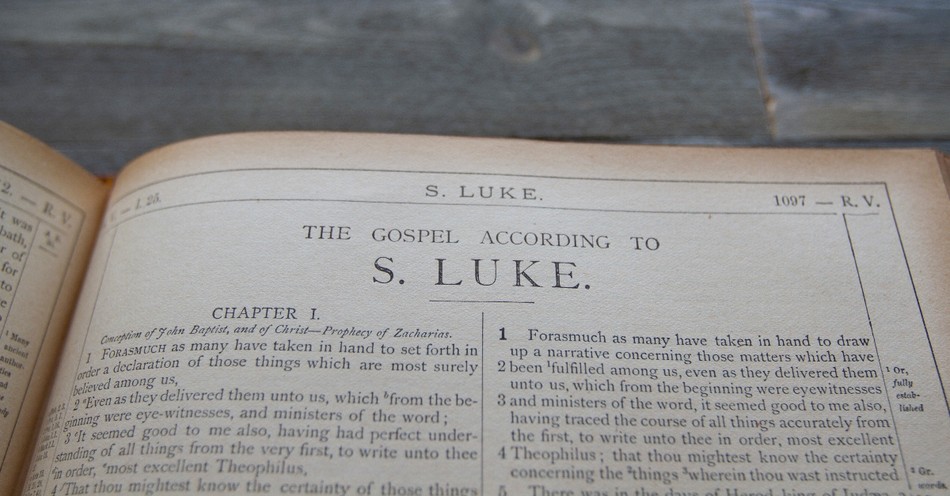"And this gospel of the kingdom will be proclaimed throughout the whole world as a testimony to all nations, and then the end will come." - Matthew 24:14
Definition of 'Gospel'
The word gospel is derived from the Anglo-Saxon word which meant "the story concerning God." In the New Testament the Greek word euaggelion, means "good news." It proclaims tidings of deliverance. The word sometimes stands for the record of the life of our Lord (Mark 1:1), embracing all His teachings, as in Acts 20:24. But the word "gospel" now has a peculiar use and describes primarily the message which Christianity announces. "Good news" is its significance. It means a gift from God. It is the proclamation of the forgiveness of sins and sonship with God restored through Christ. It means remission of sins and reconciliation with God. The gospel is not only a message of salvation but also the instrument through which the Holy Spirit works (Romans 1:16).
The gospel differs from the law in being known entirely from revelation. It is proclaimed in all its fullness in the revelation given in the New Testament. It is also found, although obscurely, in the Old Testament. It begins with the prophecy concerning the `seed of the woman' (Genesis 3:15), and the promise concerning Abraham, in whom all the nations should be blessed (Genesis 12:3; 15:5) and also indicated in Acts 10:43 and in the argument in Romans 4.
In the New Testament, the gospel never means simply a book, but rather the message which Christ and His apostles announced.
- It was afterward transitively applied to each of the four histories of our Lord's life, published by those who are therefore called 'Evangelists', writers of the history of the gospel (the Evangelion).
- The term is often used to express collectively the gospel doctrines; and 'preaching the gospel' is often used to include not only the proclaiming of the good tidings, but the teaching men how to avail themselves of the offer of salvation, the declaring of all the truths, precepts, promises, and threatenings of Christianity." It is termed "the gospel of the grace of God" (Acts 20:24), "the gospel of the kingdom" (Matthew 4:23), "the gospel of Christ" (Romans 1:16), "the gospel of peace (Ephesians 6:15), "the glorious gospel," "the everlasting gospel," "the gospel of salvation" (Ephesians 1:13).
[Excerpt from the International Standard Bible Encyclopedia]
What is the Gospel?
Read a transcript of this video by Justin Holcomb about the Gospel below:
The gospel isn't just nice, vacuous words that are sentimental. They're based on historical facts that happened. Christ died as the historical announcement. Christ died for your sins, is the theological gospel proclamation message. And so, it's not one or the other, it's not a nice sentiment that God loves you and he wants to overcome sin. And it's not just going back to the historical, that happened historically but tying those together. That Jesus died for your sins, to overcome sin, death, hell, evil, the grave.
That's very important to make we're not just giving people sentiment, but we're also not just turning them into historians. We're putting those two things together. And the good news, the thing that has that high octane pop in life that can be life-transforming and give people hope. It's not just Hallmark sentiment. It's real life, the good news that actually happened. And we need to know, and this is what the Apostle Paul said, that if he didn't rise from the dead we're the most pitied. I mean, it's all or nothing. It is, this changes everything in the history of the world or we look like fools.
How Does the Gospel Change Our Identity?
Read a transcript of this video by Chris DeRoco about the Gospel and our identity in Christ:
We basically live our whole lives looking for meaning, looking for a definition of who we are, why we exist. And what the Gospel does is it redefines us as people and gives us a place to find meaning and find significance. The good news itself is that God has reconciled us to Himself, through His son, Jesus. And so what we find there is it's not just the beginning of the Christian life, it's not just the come down front and make a decision about somebody or something. It really is the good news that you have been made a new person, that God has reinvited you back into His family and that you can reconcile to Him.
And just the way that our family really defines who we are and whether we like it or not, we're oftentimes defined by our family, by our father. Now we have a new family and we have a new father, and that radically reorients us around God and takes us away from the things that we often find our identity in, which is usually our jobs, our looks, our accomplishments. So the Gospel undercuts that and says, "You belong to your father and you belong to a new family." And that really does change everything.
Bible Verses about the Gospel
Romans 1:16
For I am not ashamed of the gospel, for it is the power of God for salvation to everyone who believes, to the Jew first and also to the Greek.
Romans 10:9-13
Because, if you confess with your mouth that Jesus is Lord and believe in your heart that God raised him from the dead, you will be saved. For with the heart one believes and is justified, and with the mouth one confesses and is saved. For the Scripture says, “Everyone who believes in him will not be put to shame.” For there is no distinction between Jew and Greek; for the same Lord is Lord of all, bestowing his riches on all who call on him. For “everyone who calls on the name of the Lord will be saved.”
John 3:16
For God so loved the world, that he gave his only Son, that whoever believes in him should not perish but have eternal life.
Mark 16:15
And he said to them, “Go into all the world and proclaim the gospel to the whole creation."
1 Corinthians 15:1-5
Now I would remind you, brothers, of the gospel I preached to you, which you received, in which you stand, and by which you are being saved, if you hold fast to the word I preached to you--unless you believed in vain. For I delivered to you as of first importance what I also received: that Christ died for our sins in accordance with the Scriptures, that he was buried, that he was raised on the third day in accordance with the Scriptures, and that he appeared to Cephas, then to the twelve.
Ephesians 1:13-14
In him you also, when you heard the word of truth, the gospel of your salvation, and believed in him, were sealed with the promised Holy Spirit, who is the guarantee of our inheritance until we acquire possession of it, to the praise of his glory.
Photo credit: Sparrowstock
Christianity.com's editorial staff is a team of writers with a background in the Christian faith and writing experience. We work to create relevant, inspiring content for our audience and update timely articles as necessary.




.jpg)